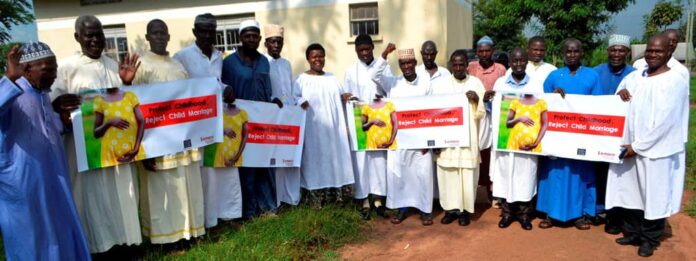Religious leaders in Kamuli district have taken a decisive stand against child marriage, launching a concerted effort to preach the message that the practice is not only socially harmful but also religiously and traditionally unacceptable, a sin, and an abomination.
Under the umbrella of the Inter Religious Council of Uganda and spearheaded by development organizations Somero and 100 Million, the “Reject Child Marriage Nawantumbi Chapter” was launched today. The initiative vows to leverage every available space and structure within their communities to safeguard the girl child from abuse and predators, ensuring they stay and complete school to protect their childhood and secure their future.
The urgent need for this intervention is underscored by alarming statistics from the Busoga North Police Region Annual Crime Report 2023/4, which revealed a grim reality: 831 girls were defiled, with 133 of these cases classified as aggravated defilement. Additionally, 270 children were reported neglected, deserted, or trafficked within the region.
Juma Nkume, the Imam of Nawantumbi Mosque and a youth leader, articulated the deep-seated issues driving this crisis. He stated that teenage pregnancies and child marriage, often manifesting as defilement, represent a “painful crisis rooted in poverty and compounded by cultural norms and parenting breakdown.”
Imam Nkume rallied for compassion and empathy over condemnation, highlighting that many girls are coerced into marriage by parents who view them as a means of survival. Others drop out of school due to a lack of basic educational and health requirements. “We should take on empathy, not condemnation. Help these girls avoid exploitation, stop blaming but listen, understand, and walk along with these girls in order to rescue them from the harsh community,” Nkume advocated.
Florence Kaduuli, the Mothers Union lead counselor and catechist at Christ the King Church of Uganda Nawanyago, is leading the Reject Child Marriage Chapter. She called for a reinforcement of family values, the rebuilding of positive cultural norms, and the championing of equitable, gender-responsive health practices and services, all buttressed by parental responsibility.
“Like Jesus Christ did, we need to look for the one lost sheep; help the girls grow and mature with dignity, looking at their bodies as temples of God not to be desecrated. This we should use door-to-door reach them where and as they are, both parents and the girls,” Kaduuli emphasized.
Gilbert Mugalanzi, Somero Project Officer for Kamuli, stressed the critical need to support girls experiencing stigma, help those who dropped out re-enroll in school, and create safe spaces for young mothers to continue their education, learn trades, and regain their dignity.
“As Somero and 100 Million, we welcome the faith-based leadership as allies in creating safety nets, bridging healthcare gaps, and providing support against stigma for these girls to regain their dignity and move on,” Mugalanzi stated.
He urged leaders to fully utilize available community spaces and structures to combat child marriages and champion empowerment as a transformative tool for children and women at risk. He also called on communities to recognize unequivocally that an adult marrying a child is unacceptable.
Mugalanzi highlighted Somero’s extensive work, noting that the organization has reached 15,000 individuals, equipping them with practical, hands-on skills to foster self-reliance and create alternatives to exploitative environments. “We are here to promote and protect the human rights of exploited children, young women, and male counterparts through education, skills development, health initiatives, and advocacy,” he affirmed.
Somero, a development initiative, was founded by a group of young people from the Kawempe Division slums following the tragic death of a 17-year-old girl subjected to debt bondage and subsequently trafficked for commercial sex work, where she ultimately committed suicide due to stigma. The organization currently operates in 12 districts, including Kamuli, dedicated to preventing such tragedies and fostering a safer environment for children.



